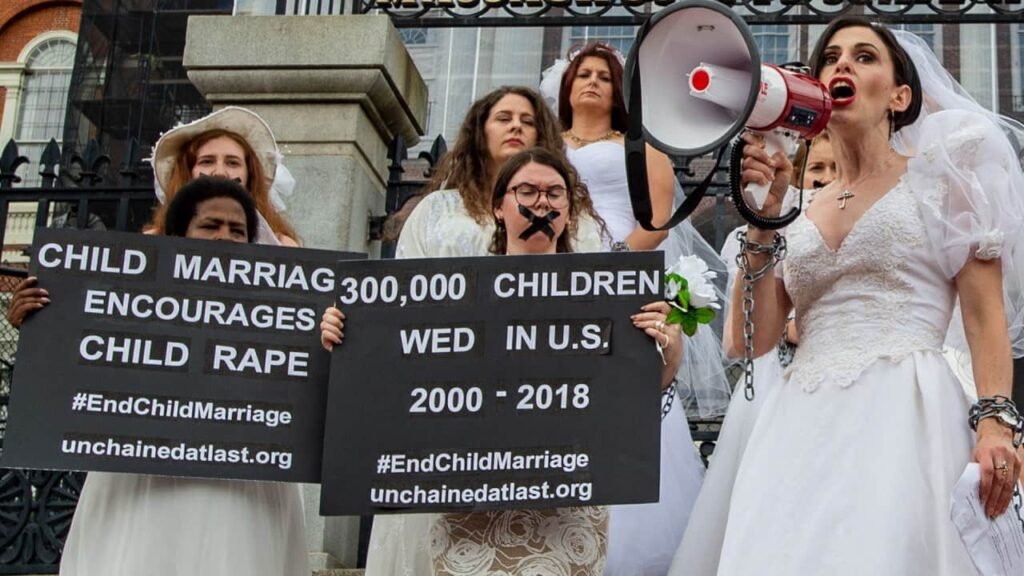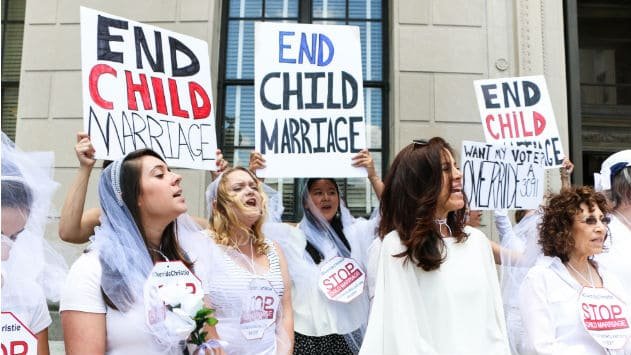In June 2024, New Hampshire made a landmark decision by passing a child marriage bill that raises the legal marriage age to 18, effective January 1, 2025.
This legislation aims to protect minors from the risks associated with early marriage. As awareness grows regarding the consequences of child marriage, New Hampshire joins other states in prioritizing the well-being of its youth.
This article will explore the details of the bill, its implications, and frequently asked questions about child marriage in New Hampshire.
What Is The New Hampshire Child Marriage Bill?
The New Hampshire Child Marriage Bill is a piece of legislation that prohibits individuals under the age of 18 from getting married.
Previously, minors aged 16 and 17 could marry with parental consent and judicial approval.
The new law eliminates these exceptions, reflecting a growing recognition of the potential dangers of child marriage.
Historical Context Of Child Marriage In New Hampshire

Historically, New Hampshire allowed minors to marry under certain conditions. In 2018, a report revealed that approximately 300 minors were married in the state between 2000 and 2017.
Advocacy groups have long argued that child marriage can lead to various social and emotional issues, including increased risks of domestic violence, poverty, and mental health problems.
Why Was The Bill Introduced?
The introduction of the New Hampshire Child Marriage Bill was driven by advocacy from organizations focused on children’s rights and welfare.
Activists highlighted the need to protect minors from being forced into marriage and the negative impacts that such arrangements can have on their futures.
Additionally, the bill aligns with a broader national movement to end child marriage.
Key Provisions of the Bill
Age Requirement
Under the new law, all individuals must be at least 18 years old to marry, with no exceptions for minors.
This aligns New Hampshire with a growing list of states that have taken similar measures.
Judicial Oversight Removed
The previous requirement for judicial approval for minors aged 16 and 17 has been eliminated.
This change simplifies the marriage process for adults while safeguarding minors from premature marital commitments.
Effective Date
The New Hampshire Child Marriage Bill will come into effect on January 1, 2025.
This timeline allows for public awareness campaigns and educational initiatives to inform citizens about the changes in marriage laws.
Read: UConn Student Dies Parking Garage: University Mourns a Tragic Loss!
Implications of the New Law

Protection of Minors
The primary goal of the New Hampshire Child Marriage Bill is to protect minors from the potential harms associated with early marriage.
Research indicates that individuals who marry young are more likely to experience domestic violence, economic instability, and mental health issues.
Impact on Families
Families will also feel the effects of the new law. By raising the legal marriage age, parents and guardians will have more time to support their children’s education and personal development before making such a significant commitment.
Aligning with National Trends
New Hampshire’s decision to prohibit child marriage is consistent with a national trend.
As of 2024, at least 13 states have raised the legal marriage age to 18, indicating a growing consensus on the importance of protecting minors.
The Legislative Process Behind the Bill
The Bill Was Proposed
The proposal for the New Hampshire Child Marriage Bill emerged from growing advocacy efforts led by various organizations dedicated to children’s rights.
Legislators were approached with evidence and testimonials illustrating the dangers of child marriage.
Support and Opposition
The bill received overwhelming support from child advocacy groups, while some opposition arose from individuals who believed in parental rights.
However, the overwhelming sentiment was in favor of protecting minors from early marriage.
Broader Impact of Raising the Marriage Age

Social and Economic Implications
Raising the marriage age can lead to better educational outcomes for young people. Studies show that those who marry later tend to have higher levels of education and better economic stability.
Comparison with Other States
New Hampshire joins states like Massachusetts, New Jersey, and Delaware in prohibiting child marriage. This collective move reflects a broader societal change toward prioritizing the well-being of youth.
Read: Examining The Maine Shooting: Causes And Responses!
Conclusion:
The New Hampshire Child Marriage Bill marks a significant step forward in protecting the rights and welfare of minors.
By raising the legal marriage age to 18, New Hampshire aligns itself with a growing movement to end child marriage across the United States.
The implications of this law extend beyond legalities, fostering an environment where young people can focus on their education and personal development without the pressures of early marriage.
As the effective date approaches, public awareness and education will play crucial roles in ensuring the success of this legislation.
FAQs:
What does the New Hampshire Child Marriage Bill entail?
The bill prohibits marriage for individuals under 18 years old, eliminating previous exceptions that allowed minors to marry.
When will the new law take effect?
The new law will be implemented on January 1, 2025.
Why was the age raised to 18?
The age was raised to protect minors from emotional and social challenges linked to early marriage.
Can minors still get married in New Hampshire?
No, starting January 1, 2025, individuals under 18 will not be permitted to marry in New Hampshire.
How many states have similar laws?
At least 13 states have laws that raise the legal marriage age to 18 as of 2024.
What are the risks of child marriage?
Risks associated with child marriage include heightened domestic violence, poverty, and mental health issues.
How did advocacy groups influence this bill?
Advocacy groups raised awareness about the dangers of child marriage and pushed for legislative reforms to protect minors.
Will parents have any role in the marriage process after the law takes effect?
After the law takes effect, parents will no longer have the authority to consent to their minor children’s marriages.
Is there a possibility of future amendments to this law?
While the current law is straightforward, future amendments could be proposed depending on societal needs and advocacy efforts.
How can the public get involved in supporting similar legislation?
The public can engage in advocacy efforts, support local organizations focused on child welfare, and raise awareness about the implications of child marriage.
Read:





